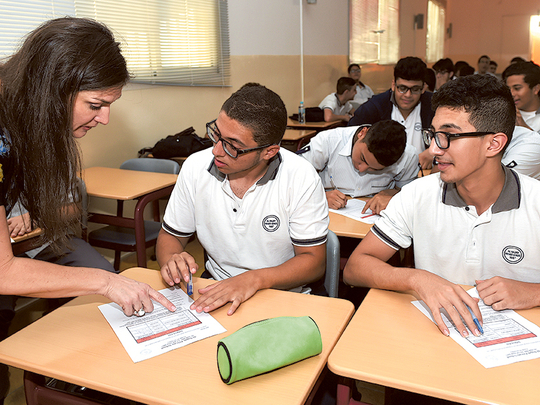
Abu Dhabi: A total of 52 public and private schools in Abu Dhabi will start offering Moral Education courses to pupils from January 2017 onwards, a senior education official said on Sunday.
The schools will be part of a pilot project to offer the course, which will become mandatory for all students from the start of the 2017-2018 academic year in September 2017. This pilot project will then help determine if teachers need further training, and if schools have adequate resources to teach the subject, said Dr Karima Al Mazroui, executive director for P-12 at the Abu Dhabi Education Council (Adec).
Mandatory Moral Education learning for schoolchildren was announced in July by His Highness Shaikh Mohammad Bin Zayed Al Nahyan, Abu Dhabi Crown Prince and Deputy Supreme Commander of the UAE Armed Forces. A statement released to media at the time said the subject would focus on the teaching of five key elements: ethics, personal and community development, culture and heritage, civic education, and human rights and responsibilities.
A total of 28 private and 24 public schools are part of this pilot project.
Speaking to media, Dr Al Mazroui said the introduction of the subject would promote good behaviour among children, and its teachings would help counter extremist ideologies.
“The Arab World is facing many challenges at this time, and having children learn to appreciate differences, respect human rights and dial down aggressive behaviours is most timely. It is an extremely wise decision by our leadership to introduce this lesson, and we expect the move to reduce absenteeism and enhance positive personality traits in UAE schoolchildren,” she explained.
At present, most schools in the UAE do provide lessons in Islamic Studies, and some private schools also designate time for the learning of other faiths. However, there is little formal teaching of universal human values.
The delivery and curriculum for Moral Education is being developed by the Crown Prince’s Court, in collaboration with curriculum experts with the UAE Ministry of Education, the Adec, which regulates education in Abu Dhabi emirate, and other educational authorities.
The subject will be taught as a separate lesson once a week to pupils enrolled in Grades 1 to 11. Its elements will also be integrated into courses taught in kindergarten and Grade 12 at Abu Dhabi schools.
Each lesson itself will last for about 40 minutes, and will be delivered by teachers who now teach UAE Social Studies, another mandatory school subject, to pupils.
The style of assessing pupils’ understanding of subject material will also be different, Dr Al Mazroui said.
“Instead of exams, learning will be more hands-on and practical, and projects will be used to assess pupils’ level of understanding,” the official explained.
The subject will be offered in Arabic at public schools, and in private schools following the ministry curriculum. Private schools, on the other hand, will deliver the lesson in English, but will have also have a choice to offer it in Arabic.
Dr Al Mazroui stressed that Moral Education will not focus on the tenets of any particular religion.
“Instead, the curriculum will reinforce ethics, encourage entrepreneurship, and urge a love for learning, ambition and creativity among pupils. It will also advocate tolerance, which is essential in a country with as multicultural a fabric as the UAE,” she said.
A range of content materials, including textbooks and electronic resources, are currently being developed, and more details about these are expected to be released over the next few months.
Teachers will also soon commence training to be able to effectively teach Moral Education, starting with those working at schools that will conduct the pilot project, Dr Al Mazroui said.
What: Mandatory school subject for UAE pupils from September 2017
For whom: All pupils from Grades 1 to 11. In Abu Dhabi, the content will also be integrated into other subject lessons for pupils in kindergarten and Grade 12
How often: Once a week
What it will teach: Ethics, personal and community development, culture and heritage, civic education, and human rights and responsibilities.
Other details: To be offered in Arabic in public schools and private institutions following the UAE Ministry of Education curriculum. Will be offered in English at private schools, but these institutions can also choose to deliver it in Arabic
Assessment style: Project-based and hands-on












